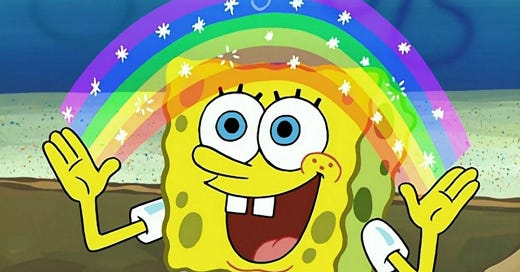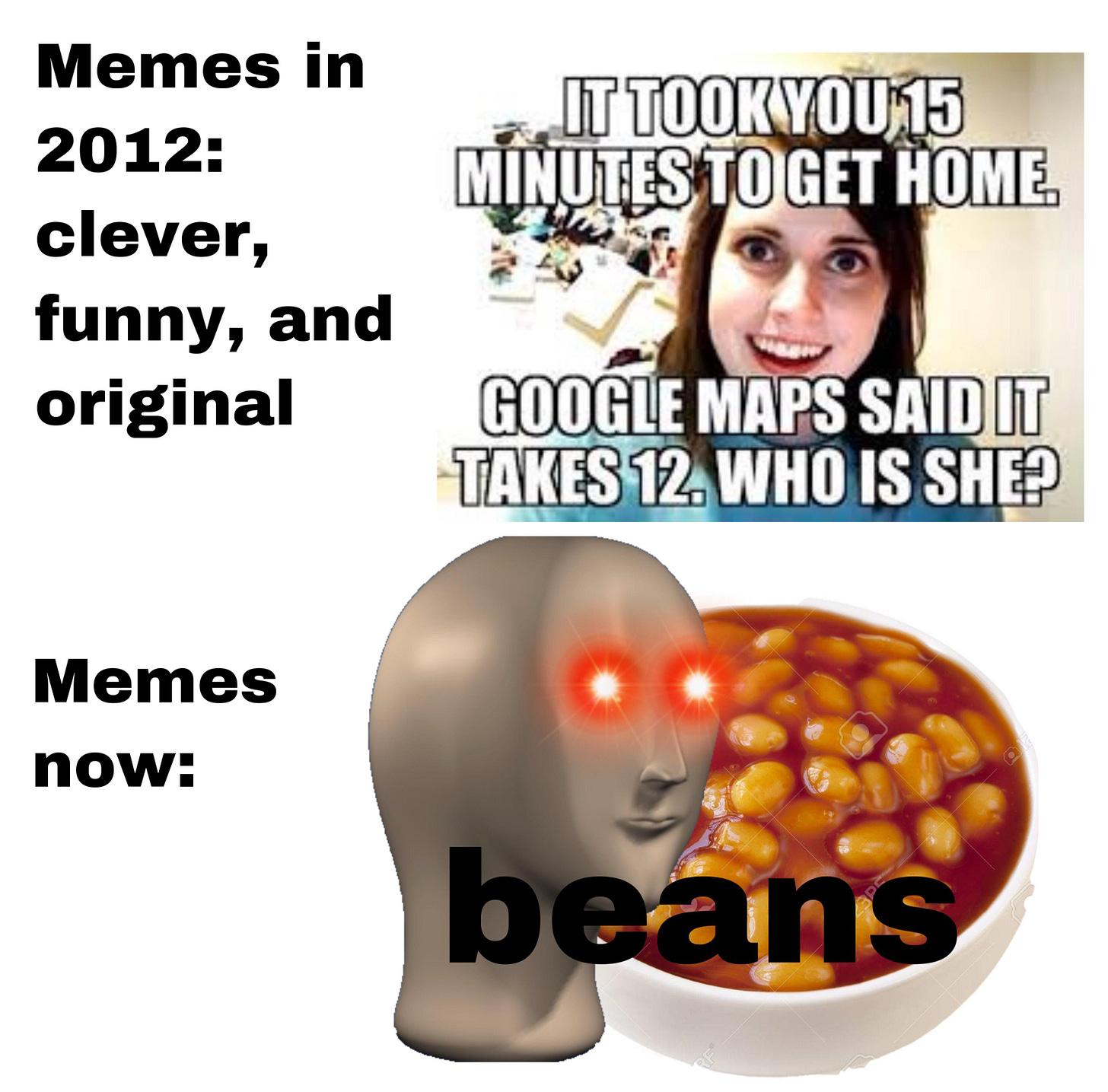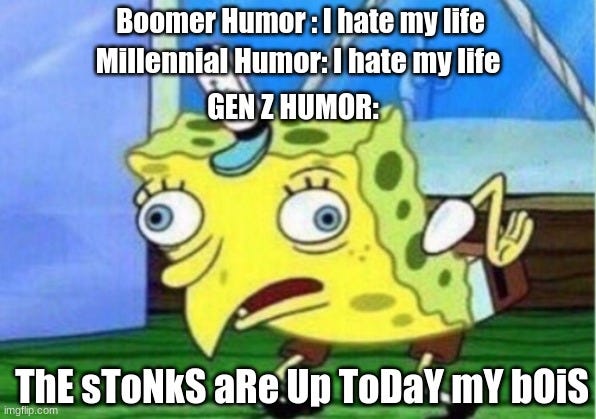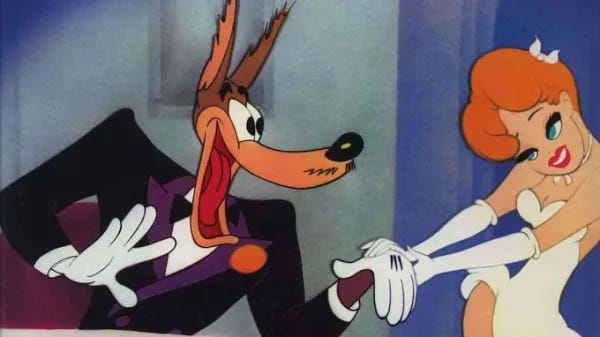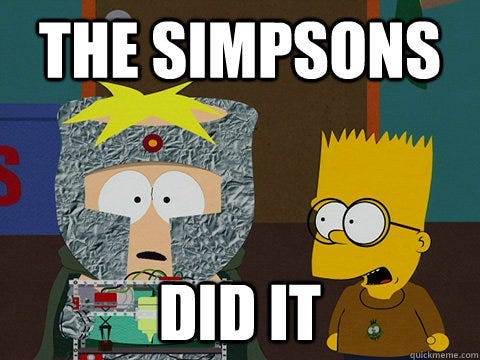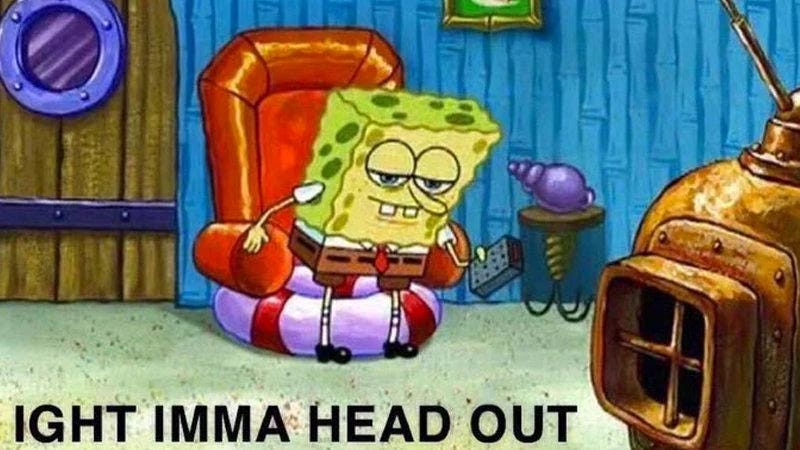My two years spent in graduate school made me feel like a cultural anthropologist. I was one of three Proper Millennials, but I may have been The Most Millennial (which is why I would write a sentence like that) in that I was born squarely in the middle of the demogrpahic. Everyone else in graduate school was younger by quite a few years - I’d say roughly 7-9 years on average. I also made friends with several undergrads. This is all to say that I was suddenly thrust into a ton of cultural insight. One of my biggest takeaways is that their only agreed-upon monoculture is Spongebob Squarepants.
This is not just going to be a “kids these days!” post. This is also not going to critique whether or not Spongebob Squarepants is a good or bad show. That’s irrelevant. I’m genuinely curious and fascinated by the ubiquity of Spongebob Squarepants. Think about it: is there any other pop culture character more memed than Spongebob and his underwater friends? The Real Housewives and The Office are a close second, but there is a Spongebob meme for everything and we’ve all used them.
Let’s investigate: What is it about this show and why has something taken hold of a generation and a time period that no longer has a monoculture?
I’ve barely seen Spongebob which was not a problem until I was around people roughly ten years younger than I am. I would tell them that I was too old for it. The idea for this essay sprung up when a 24-year-old was in such disbelief that I wouldn’t ABSOLUTELY LOVE IT that she looked up when it aired and informed me that it debuted in 1999. “So you were alive,” she said as she held the phone to my face with this groundbreaking data.
LOL, yeah, I was alive, but it was 1999. It was the last year of our lives before Y2K was about to wipe us all out, so we had to act cool. I remember a handful of us trying to impress our 20-something 5th grade teacher by lying to her that we had also seen The Blair Witch Project. We weren’t watching Spongebob - or, most likely, admitting to it - we were transitioning from The Backstreet Boys to Korn.
The premiere date presents another bizarre piece of the Spongebob puzzle that I only recently thought about. If that show came out when I was roughly 11-years-old, then that means that people who were almost a decade younger than me were watching it since they were babies. Right? So it wasn’t a show that they came to so much as it was a show that was always on from as long as they can remember. How many things that you watched when you were six-years-old are still a hilarious meme? How many things from first grade do you still swear by?
I struggled to think of something - anything - similar to this for my generation. Younger Gen Z and elder millennials may have Ren and Stimpy, but my squarely-in-the-center of the generation cohort can’t claim it in the same way. The cartoons we watched as very young children included Doug and Rugrats, but it would have been embarrassing to rave about a cartoon about babies well into your teens.
The cartoon that I was raised on, watching it at a way-too-young age the second it aired until adulthood was South Park. South Park was released before Spongebob. Compare those two and then circle back and try to tell a 12-year-old in 2002 that the sponge show was as edgy and funny as South Park. Maybe that’s the problem? Maybe my age group’s innocence was ruined not by a talking sponge, but by a talking piece of poop (Mr. Hankey - he has a name, you know). After all, Spongebob’s defining charicteristics are his optimism and innocence. Those are the polar opposite of what Eric Cartman is all about.
My fiancé suggested that our generation had quotes. Anchorman and Chappelle Show quotes bound us. I can still hear people shouting “YEAH-A!” in the halls of my high school. I’m not so sure about the quote theory. Quote Culture felt Gen X to me, but it also feels like its origins are in nerd culture. Then it hit me: so are a ton of things that become cool, including Spongebob.
When I think back, Spongebob had the reuptation for being childish OR a show for stoners. I knew one kid my age who openly loved it, but that was it. There were so many jokes about the show making you lose braincells. People liked it fine, but there was always this air of “wait - does that mean you smoke pot?” associated with saying that you watched it as a teenager in the 2000s. It wasn’t yet for everyday use and relatability, but it would make sense that young kids in the 2000s would become enamored with the show. He lives in a pineapple for crissakes! If you’ve ever done improv, then you know that pineapple is the FUNNIEST food (it ties with spatula and dildo for answers to the initiating question: “can I get a suggestion of anything at all?”).
TV in general was different for young adults in the 2000s. For example, anime was not cool nor was it widely available. Now it is very acceptable to not only like anime, but be into K and J dramas and music. I had a brief anime and J-pop phase, but I had to travel to a very specific comic book shop to get my gear and the only TV show that I could easily access was Sailor Moon (which I watched in 5th grade, but had the awareness not to talk too openly about because I knew that I’d get made fun of even more than I already did for being a Weird Kid).
Maybe my former Weird Kid status is what makes all of this so fascinating to me. The things that would have gotten me thrown into a social graveyard are now embraced. Subcultures barely exist and your interests no longer make you bully-able.
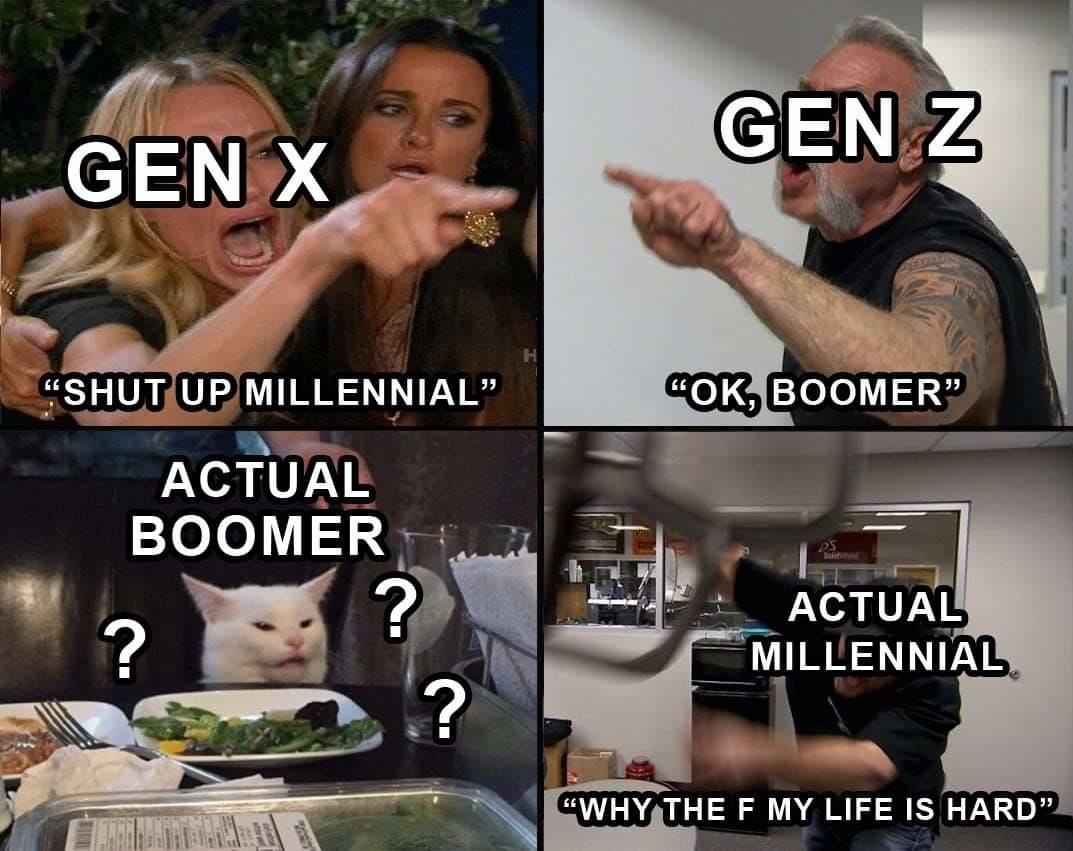
Spongebob went from being something that was associated with the stoner subculture to being a unifying subject to anyone under 30. This has followed Gen Z humor which tends to be more absurdist than Millennial humor, making light of the tropes of a meme rather than the content of the meme and thus allowing the meme to do double - and sometimes triple - duty in making the recipient think “same”. Comedy nerds know this as anti-comedy. In lieu of a substantive joke, there is commentary on the structure of the joke itself.
What does this have to do with Spongebob? If you’ve been on the internet at all in the past five or so years, then you know that Spongebob memes are everywhere and they exist both as a traditional meme and an absurdist meme.
Absurdist comedy isn’t new - but it went from being niche to being the mainstream way this generation accesses comedy. Internet comedy now takes the niche and exposes it at every level, memes it up, spits it out, and moves on to the next thing. TikTok trends take over everyone’s speech and posting patterns for an average of 2 weeks until it no longer feels very demure. Then we’re onto the next thing. The only pop culture that remains? Spongebob. Spongebob never goes anywhere.
Spongebob’s popularity with Gen Z is so serious that director David Eggers credited the show with introducing the generation to Nosferatu, thus increasing interest in his remake of the 100-year-old silent film. That idea isn’t new either. Looney Tunes did the same, consistently referencing pop culture, the news, and films. In fact, I’d argue that Looney Tunes felt a bit more “for adults” than some of the other examples I’ve already used. So does that mean that Spongebob is nothing new? Kind of.
The other night I went to a screening of the animated film Memoir of a Snail directed by Adam Elliot. Elliot’s stop animated films are definitely for adults with themes of grief, alcohol abuse, and depression in everything I’ve seen of his. His films are also very funny. A Letterboxd review I liked of the film said,” When people scream ‘animation is not just for kids’ on twitter, this is the kind of movie they should be talking about, not Puss in Boots: The Last Wish (a good movie though).”
I agree with that. I want to scream this back at the 24-year-old who told me “it’s very funny for adults”. Not every animated thing that you like has to be “also funny for adults”. You don’t know what kind of adult I am!
We are throwing blanket demographics at animation. I struggled to find Spongebob’s initial target demographic with online sources saying “from 2 to teens!”. I’m sorry…what? I think this is squarely an 8-13 level show and that’s necessary. It’s why All That was so popular - it aimed to entertain that age group and if you compare All That to SNL, you will certianly laugh a little at both but you can tell which one is for an older demographic. Pixar and Disney have little tokens for adults in them, but Up looks like cotton candy compared to Memoir of a Snail. Both are incredible films!
Animation has always had this target audience struggle. Let’s go all the way back. Look at Tex Avery cartoons where a wolf is oggling a hot lady. Is that not really adult? (Please, adults, don’t unravel your tongue like a red carpet when you see a beautiful woman). Did kids really understand the Merrie Melodies short featuring Hollywood stars? Or even Animaniacs’ rapid-fire Hollywood references decades later? No, but we all watched it cause ooooOoOooOooo cartoons.
There have been plenty of animated movies and shorts that were for adults (like this wild Lenny Bruce short film. Warning: it’s Lenny Bruce.), but The Simpsons is what changed this concept forever on TV. With the success of The Simpsons came other more adult animated shows such as Beavis and Butthead, Daria, Space Ghost Coast to Coast, The PJs, Dr. Katz, King of the Hill, South Park, and more. Spongebob was compared to its 90s contemporaries like Rocko’s Modern Life and Ren and Stimpy. In 2001, Adult Swim debuted with one of my favorite shows: Home Movies. That means that in barely over a decade, animation exploded. The Simpsons really did it.
What does that have to do with Spongebob memes? As so many pop culture critics have opined, our culture is now contextless. You don’t have to have seen this show or think a single episode is any good to laugh at a Spongebob meme or a short clip. I’ve asked so many people if they’ve seen certain shows only to be told, “I’ve seen clips.” Thus it doesn’t matter if the show is funny to adults in understanding of how the show has this much power on the internet. It doesn’t matter if the show is even good because memes are inherently contextless.
Spongebob does not feel nearly as adult as the adult animated shows previously mentioned, but that might be the reason for its success. It’s silly while not making children feel like they are being talked down to. A 12-year-old is more likely to admit that they’re still laughing about Squidward than Tommy Pickles. Gen Z relates to Spongebob, as this young writer wrote three years ago. The writer asserts that it is a combination of nostalgia and relatability that has only grown with time. Spongebob’s innocence and optimism clash with the internet age so well that fans can watch the show as comfort food or use it to make jokes about the cruelty and mundanity of modern life which provides the sweet comfort of comic relief. The sponge contains multitudes.
Spongebob’s hold on a generation - and on internet culture - may be due to a combination of right place/right time in its ability to grow with a generation that took it with them to the internet. And now, here we are. Let’s use those memes for good.
What I’m reading: All Things Are Too Small by Becca Rothfield, a non-fiction book arguing against minimalist culture and I am loving it.
What I’m watching: Bad Sisters, RuPaul’s Drag Race and eagerly awaiting new seasons of Severence and The Traitors. Also watching a lot of old 90s law dramas and thrillers.
